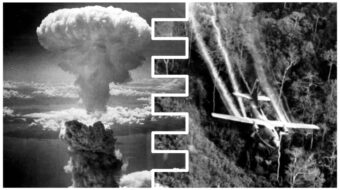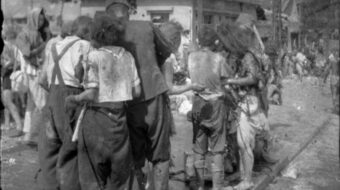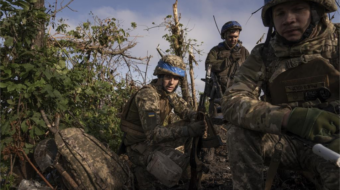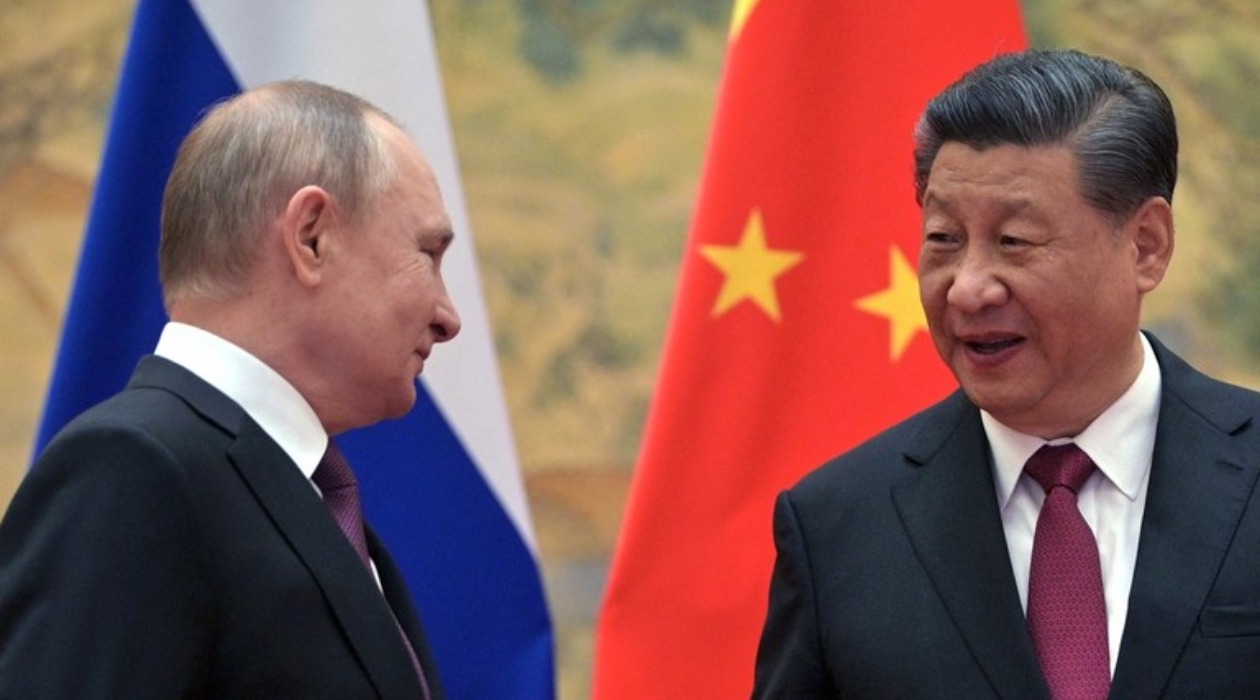
Russian President Vladimir Putin and his Chinese counterpart, Xi Jinping, issued a joint demand Thursday that NATO halt its plans for further expansion and end their continued push to whip up a “Cold War mentality.” Putin met with Xi in China, only a day before the opening of the Winter Olympics in Beijing.
As the two nations issued their statement, the U.S. ignored the call for peace and sent a seventh planeload of offensive weapons, including missiles and anti-tank rockets, into Ukraine. NATO, via member state Turkey, sent more drones to the Ukrainian military. Turkish drones have been used by Ukraine in the past to kill Russian-speaking separatists in the People’s Republics of Luhansk and Donetsk in eastern Ukraine.
The Ukrainian government refuses to recognize those regions as autonomous, even though it agreed to so in 2014 in the Minsk Declaration. Right-wing and outright fascist entities, with the approval of the government in Kiev, continue to kill civilians in the Russian-speaking areas of eastern Ukraine.
“The parties oppose the further expansion of NATO and call for the North Atlantic Alliance to refrain from ideological approaches from the time of the Cold War,” the joint Russian-Chinese statement reads. It also urges NATO “to respect the sovereignty, security, and interests of other countries,” and, referring to Russia, “the diversity of their civilizational and cultural-historical ways; and to deal with the peaceful development of other governments objectively and fairly.”
The two countries also emphasized the need for cooperation between governments around the world, given the challenges of a fast-moving global economic situation, political upheavals, and a pandemic that continues to threaten millions and affect international security.
The joint statement backs Moscow on what it has been saying for months now—that it needs security guarantees limiting the expansion of NATO into Ukraine and Georgia, effectively barring the two former Soviet republics from membership.
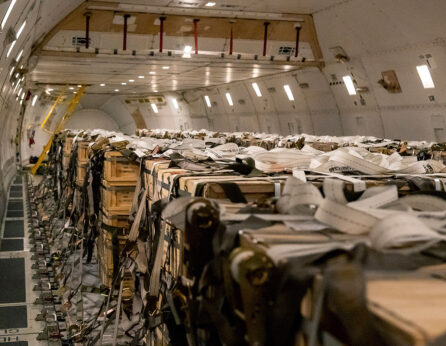
Documents leaked to the Spanish newspaper El Pais this week show that the U.S. had formally rejected any such agreement. Instead of seeking a compromise to end the crisis, the U.S. and NATO have followed up with another round of new weapon and troop deployments to eastern Europe.
Some U.S. lawmakers did their part to raise tensions Thursday and Friday rather than to work for peace. They continued to try to rush through Congress powerful sanctions against Russia that could be levied immediately, not waiting for any Russian troops to actually cross the border into Ukraine. Some are resisting, however, saying sanctions should be levied only after an invasion actually occurs.
Beijing has committed to working with Moscow to develop financial systems that are resistant to sanctions and minimize dependency on the U.S. dollar.
While Russia would certainly welcome such help, it has already taken measures to protect against U.S. sanctions. Russia’s economy is largely prepared already to resist sanctions, having drastically reduced its dependence upon U.S. dollars over the last several years. The country has piled up enormous currency reserves of almost $700 billion, mostly denominated in euros, which can shield the ruble from collapsing under U.S. pressure.
The national debt in Russia is far lower than the amount in the currency reserves, which further strengthens their ability to ride out sanctions.
Another hitch in the U.S. economic warfare plan is Europe, which is heavily dependent upon natural gas and oil from Russia and has been reluctant to go along with the harshest possible sanctions. That means Russia can likely count on continued income from those countries, especially Germany, which has a joint pipeline with Russia under the Baltic Sea.
The improved condition of the Russian economy, however, works both ways. It is actually another reason why war hawks in the U.S. and NATO want to strike out against the country sooner rather than later before it becomes even more costly for the West to do so.
In order to steer attention away from the huge infusion of new weapons and drones into Ukraine Thursday, the U.S. put out additional alleged intelligence reports that the Russians were planning another false flag attack on either themselves or Russian-speaking civilians in eastern Ukraine. It involved a fabricated video that would supposedly be used by Moscow to make the case for invading Ukraine. The U.S. claimed the video involved the use of actors playing mourners and piles of corpses.
On Friday morning, U.S. Deputy National Security Adviser John Finer backed off a bit from this after members of the press objected that the U.S. government had provided no proof of the production of any such video.
“We don’t know definitely that this is what they (the Russians) did, but we do know that they have a history of doing this type of thing,” Finer told the media. Members of the press have noted that it was their job to be skeptical, reminding U.S. government spokespeople of the false reports about weapons of mass destruction that were used to justify the U.S. attack on Iraq years ago only to discover later that there were no such weapons.
The Russians said the reports about a video, like previous reports of false flag attacks allegedly being mounted by them, were false and designed, in fact, to lay the ground for military action against Russia by the West.
Another problematic issue for the war hawks in the U.S. and NATO is the steady flow of reports of how the Ukrainian people on the streets are going about their business as usual, not particularly worried about an impending Russian “invasion.”
To counter the disconnect between what Washington says is happening and the apparent reality on the ground in Ukraine, MSNBC on Friday sent a camera crew to a pizza shop in Kiev. There were no customers at all visible, but the network’s reporters talked to the owner who, they said, has offered free pizza to anyone who goes out and buys a gun to shoot Russians when they invade. The pizza proprietor assured MSNBC that the Russians will indeed invade and that the guns will be needed.
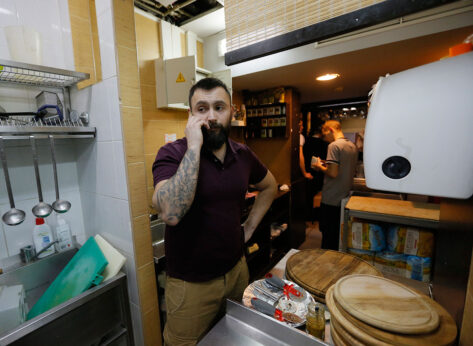
The network did not give the name of the pizza shop, but Leonid Ostaltsev, a former Ukrainian army serviceman and founder of Veterano Pizza in Kiev has been a reliable anti-Russian voice in media outlets for years. He started the restaurant with money from “a Ukrainian-American investor,” according to the Atlanta Journal-Constitution’s restaurant and food reporting team.
As host of the radio program Army FM, he has been a vocal advocate of the Ukrainian government’s fight against separatists in the eastern part of the country. And whether it’s the Associated Press, the New York Times, Slate, or apparently, MSNBC, Ostaltsev has established a reputation as the go-to guy whenever a Western reporter needs a “man-on-the-street” to speak up for war.
A few moments after the pizza shop segment, Admiral James Stravridis, the U.S. officer who formerly commanded all NATO forces, appeared on MSNBC and declared, “I want to associate myself with the remarks by the pizza store owner in Kiev.”
Good reporting or well-planned nonsense?



